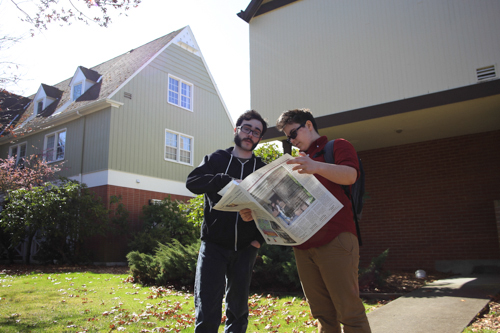The on-campus beekeeping club, Hive Minders, will be replacing a queen honeybee in early April in an attempt to modify the genetic structure of their bee colonies.
Among many other objectives, the club uses their three hives, located on the roof of Thompson Hall, to help spread awareness of the honeybee.
“We’re basically a club like any other on campus, but we have a very special devotion to this incredible creature that many people know as the honeybee,” club president Kyle Kolisch said.
“I would argue that the honeybee is one of the most important creatures to the human race, equally as important as our best friend the dog.”
With a keen sense of smell and chemical sensitivity, honeybees are complex creatures that mankind relies on for crops such as almonds, soy beans and corn.
Hive Minders nurtures and cares for their colonies, providing medication to fight diseases such as parasites and dysentery. In the fall, the honey produced by the bees is sold at the student market and to club members. Everyone is careful to leave enough for the bees to survive on during the winter.
“As a beekeeper, you have to leave enough honey for the bees, and also take enough for yourself and others as well,” Kolisch said.
“A good beekeeper takes enough so that the bees and the beekeeper get a fair share. Obviously the most important thing is to keep the bees alive.”
Currently, one of the three hives is overly aggressive. All the bees in that hive contain the same genetic material as the queen, who is the only bee able to lay eggs.
An egg becomes a queen egg if it is fed copious amounts of royal jelly, which could be described as a densely-packed multivitamin. The club believes that by replacing this queen with a more docile one, the entire hive will become calmer.
“We are hoping to requeen two of our hives in the future and get a daughter queen off of our strongest (and nicest) hive to requeen one of the other two, or start up a new hive altogether,” senior Christine Anderson said.
When introducing a new queen, it is necessary to end the life of the old one. If she were instead released, she would simply return and regain control of the hive. If she were allowed to stay, there would be a battle to the death between the two queens, and there is a chance the new queen might lose.
“If you want to change the traits, you change the queen. We’ll slowly have a hive that develops different properties, different characteristics,” Kolisch said.
“The beekeeper is not necessarily playing God here. The hives also know when their queen is getting weak, and if the beekeeper doesn’t introduce a new queen, the hive will.”
Hive Minders also offers a class, taught by a local beekeeper, that meets every Wednesday.
It is a non-credit course, though upon completion one can apply to earn an apprenticeship in beekeeping.
Although the hives are fairly self-sustainable, especially during the summer, they are attended to year-round by passionate volunteers.
“What I really want people to do is to learn about the bees, because more so than raising livestock or cultivating a farm, beekeeping is not just about taking the honey from the bees,” Kolisch said.
“I think it’s part of Hive Minders’ job to give people the opportunity to learn from [the bees] and interact with them.”



